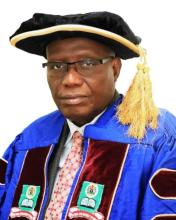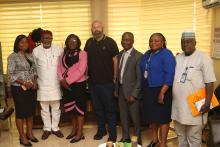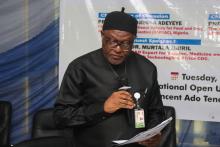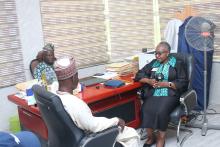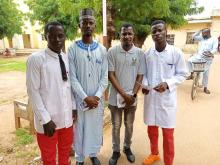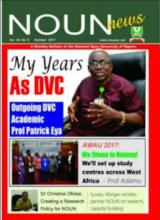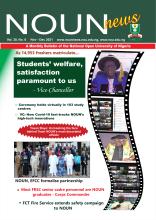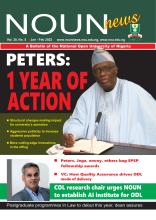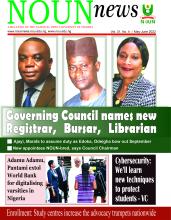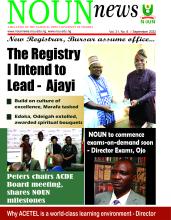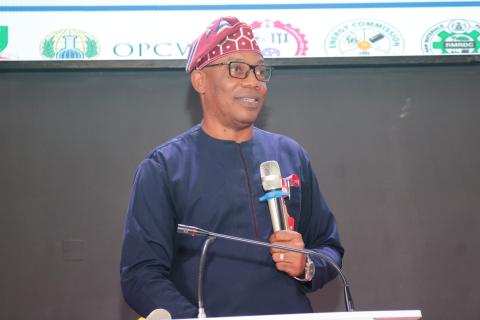
The Minister of Innovation, Science and Technology, Chief Uche Geoffrey Nnaji, has rallied support to shift toward Artificial Intelligence (AI) driven researches that are capable of ameliorating the persistent challenge of sustainability.
Nnaji said over 200,000 Nigerians are actively participating in the Commonwealth AI Academy Initiative, contributing to data-driven environmental and developmental programmes, thereby positioning the country as a leader in continental AI innovation.
He made this known during the 10th Annual Symposium of the American Chemical Society (ACS) Nigeria International Chemical Sciences Chapter's Opening Ceremony on Monday, May 5, 2025 at the headquarters of the National Open University of Nigeria (NOUN), Abuja.
The minister, represented by his Special Adviser, Engr. (Dr.) Patrick Oghuma, stated that the theme of the symposium: “Advancing Sustainability Through AI-Driven Chemistry,” captured the urgent need to integrate AI into chemistry to address real-world problems and secure the nation’s future.
He underscored that sustainable development would remain elusive without bold, AI-driven scientific solutions and challenged chemists, especially young scientists, to pursue research that is solution-oriented, nationally relevant, and globally impactful.
Nnaji expressed concern about a lingering gap between research output and practical impact; saying that many brilliant scientific contributions remain buried in academic journals, never reaching the industry or policymakers that could bring them to life.
While highlighting AI’s vast potential, the minister noted that machine learning can now accurately predict molecular properties, accelerate material discovery, and identify eco-friendly chemical substitutes, citing breakthroughs in biodegradable materials, safer chemical processes, and energy storage technologies as examples of how AI is revolutionizing chemistry.
In a passionate message to young Nigerian chemists, he urged them “to reject mediocrity and embrace discipline and excellence; geography, poverty, or lack of resources are not acceptable excuses, because some of the greatest breakthroughs have emerged from modest environments.”
Speaking on behalf of the Vice-Chancellor, Prof. Olufemi Peters, the Deputy Vice Chancellor (Academic), Prof. Chiedu Mafiana, expressed delight at NOUN's role as host for the milestone symposium.
He praised the ACS Nigeria Chapter for a decade of excellence in scientific dialogue and for establishing a platform that bridges academia, industry, and policy in meaningful and enduring ways.
Peters emphasised the transformative role of AI in revolutionising chemical processes by predicting, modeling, and optimising for efficiency, lower energy consumption, and minimal waste, describing AI as "a frontier force" in pushing sustainable innovations in chemistry.
“At NOUN, we are deeply committed to the ideals of accessible, technology-enhanced education and pertinent researches that address national development and global goals,” he added.
The VC, a professor of chemistry, called on participants to fully engage with the symposium’s sessions—from AI-enhanced brain chemistry to sustainable cement manufacturing—highlighting the potential for knowledge generated could spark real-world change.
Delivering the first keynote address, Dr. Abdullahi Mustapha, Director-General and CEO of the Energy Commission of Nigeria, who was represented by Dr. Shehu S. Mustapha, Acting Director of Energy Transition and Linkages, illustrated how artificial intelligence is fast becoming an indispensable ally to chemists.
While celebrating the potential of AI-powered chemistry, Mustapha acknowledged significant hurdles facing researchers on the continent: data scarcity, limited AI literacy, and inadequate digital infrastructure, particularly in Nigeria.
“AI systems are only as good as the data they are trained on, so we must invest in generating high-quality, context-specific datasets and equip chemists with the skills to work across computational and experimental domains,” he stressed.
Earlier, while giving her welcome address, the chairperson, ACS Nigeria, Prof. Edu, described the symposium as a "premier gathering of chemists, researchers, professionals, industrialists, and policy makers" and a celebration of 10 years of shared commitment toward scientific excellence and global sustainability.
She stated that this year's theme was particularly apt, stating that as the world battles with climate change, energy insecurity, and resource depletion, chemistry offers indispensable solutions, with artificial intelligence now a toolkit, it is a new era of accelerated discovery and intelligent design.
She thanked NOUN for their continued support, stating that Prof. Peters is a crucial supporter of the society, which led to the award given to him for his contributions to open and distance learning and chemistry education, research, and practice globally.
- Log in to post comments
- 167 views


